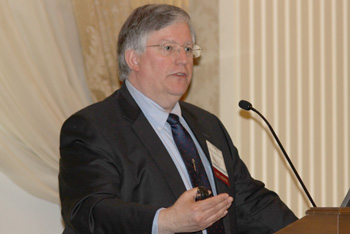May 20, 2013 – While Charles Franklin was a visiting professor at Marquette in 2012, Marquette Law School's poll became the definitive source of information about public opinion in Wisconsin, as well as the largest independent polling project in the state's history. The poll was accurate in predicting every major election that year, including the races for governor, U.S. Senate, and president.
Franklin, presented “Divided Wisconsin: What Unites and Divides the Citizens of the State?” to more than 130 judges and lawyers at the State Bar of Wisconsin PINNACLE® Litigation, Alternate Dispute Resolution, and Appellate Practice Institute in Milwaukee on May 16.

Professor Charles Franklin, luncheon speaker at the Litigation, Dispute Resolution, and Appellate Practice Institute, says, “As we saw here in Wisconsin, with the Democrats in the spring and the Republicans in the fall … if you believe your own spin you fail to have the information you need at a time when you could actually change things. Then you are very surprised on election night because you convinced yourself to believe and you didn’t look at the data.”
To see photos from the Litigation, Dispute Resolution, and Appellate Practice Institute, visit the State Bar of Wisconsin’s Facebook page, or click here.
Franklin said, “Elections turn on both who votes and which candidate they prefer, and that public opinion is an amalgam of differences due to values, ideology, religious practice, age, sex, region, and partisanship.”
So here’s what happened: Gov. Walker was re-elected, Obama and Baldwin won. How did all that happen and what’s ahead in 2014 and 2016?
In the 2010 elections, more counties went red than usual. The question is, “Was 2010 just an aberration fueled by the Tea Party and opposition to Health Care reform, or did it represent a real shift in the geographic alignment of voters in the state with areas becoming more Republican?” asked Franklin.
“The results of the recall election in June of 2012 seemed to suggest that a permanent realignment of the geography had in fact occurred,” said Franklin. “Folks in and out of the state thought that the November election would replicate this pattern.”
As we know, that didn’t happen, “How do we go from June with Walker winning by 6.8 percentage points to Obama taking 6.9 percentage points? The counties that were red in June were still red, but not quite as red in November, and if the Democratic counties had voted the exact same way in November that they did in June, Obama still would have one Wisconsin.”
Why did votes shift? In 2010, 2.1 million voters turned out. In the recall election in June of 2012, an additional 400,000 voters came to the polls. The November 2012 election brought yet another 500,000 voters to the polls.
“That 900,000 voter difference between 2010 and 2012 shows you how much elections can be influenced when almost a third of the voters can be counted on not coming to the polls,” said Franklin noting that presidential election years naturally draw larger numbers.
Deb Heneghan is the publications reporter for the State Bar of Wisconsin. She can be reached by email at or by phone at (608) 250-6135.
Referring to the Thompson/Baldwin election in November 2012, Franklin spoke to the strong effect one-sided advertising can have on a campaign. Thompson had a nine-point lead and then stopped advertising. Baldwin picked up advertising and four weeks later she had a nine-point lead and won by five points. “Political science shows pretty convincingly, that one-sided advertising is the place where you can see public opinion change,” said Franklin. “If both sides are advertising, neither does a very good job to make a shift in opinion.”
So where do we go from here? “As we saw here in Wisconsin, with the Democrats in the spring and the Republicans in the fall, and as we saw nationally, most prominently with the Romney campaign, if you believe your own spin you fail to have the information you need at a time when you could actually change things. Then you are very surprised on election night because you convinced yourself to believe and you didn’t look at the data,” Franklin said.
“Doubt the data, but don’t deny it,” he concluded.
For more information, visit the Marquette University Law School Poll webpage.
The Marquette Law Poll is a public policy initiative of Marquette University Law School. Through debates, symposia, public lectures, panels, conferences, and the Law School's On the Issues series, Marquette University Law School has established itself as a leading venue for serious civil discourse about law and public policy matters affecting the region and beyond. Franklin will join the will join the Marquette University Law School as a full-time professor on Aug. 1, and he will continue to lead the school's poll.
The next institute, Real Estate and Business Law Institute on June 13 and 14 in Middleton, is held in conjunction with the swearing in of Patrick Fiedler as the 58th State Bar President.
Related
